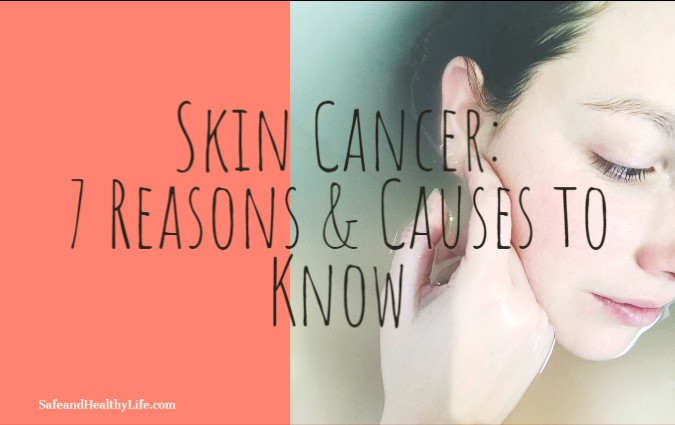What Does Skin Cancer Entail?
Skin cancer makes up the majority of cancer cases across the US.
“Your skin cells grow and die each day”
When your skin cells die, new cells replace the dead cells. When the process of developing new cells occurs abnormally, it causes skin cancer.
The cells multiply at a faster rate than they mature, thus forming a tumor of immature cells that become harmful to the body.
You can develop either melanoma or non-melanoma types of cancer.
Melanoma: Melanoma is the most dangerous type and is less common than other forms of skin cancer.
Non-Melanoma: Non-melanoma cancer is less severe and accounts for the highest percentage of skin cancer.
When cells that give our skin their color become cancerous, melanoma develops.
Skin cancer is the most common cancer diagnosed in the United States and can be divided into squamous cell carcinoma, basal cell carcinoma, melanoma, and some less common cancers.
People with close blood relatives who have melanoma skin cancer are at increased risk of developing the same.
1. Early Discovery
“Early detection of skin cancer gives you the greatest chance of successfully treating skin cancer”
If discovered early, you can successfully treat it and recover fully.
However, Melanoma cancer is more severe and causes the highest death rate in skin cancer.
If you discover either type of tumor in its late stages, it becomes harder to treat and can turn fatal.
Propose going for a cancer screening at least once a year, and consult a doctor if you note any skin changes.
| Read also: The Different Types of Biopsies and Tests to Diagnose Skin Cancer |
2. Skin Cancer Screening
The increase in skin cancer has resulted in the need to understand how it may affect you, and ways you can work to protect yourself.
“Always propose to have a skin cancer screening every year to stay safe”
Early detection found from a skin cancer screening in San Antonio increases the chance you’ll successfully treat cancer, and more easily as well.
Examining your skin for suspicious changes can help identify skin cancer in the earliest stages.
Now coming real topic, the five most important causes of Skin Cancer are:
3. Climate Change
The world climate continues to become harsher, and the manifestation is in extreme weather conditions such as scorching sun, tsunamis, typhoons, and other natural catastrophes.
World leaders have tried to come together to help reduce the contribution of human beings in making the weather harsh.
Humans contribute to extreme weather through
- pollution in industries
- cutting down trees
- poor waste disposal
4. Global Warming
Global warming is one of the consequences of pollution, and the effects have already started.
Skin cancer has been on the rise due to the depletion of the ozone layer that guards against harmful sun rays.
5. Changes on the Skin from Exposure to the Sun
It is summer, and you have been waiting for the sun throughout winter. You find time to lay in the sun all day long at the beach, at the swimming pool, and in your backyard.
However, exposure to sunlight for long hours can harm the health of your skin. It may make your skin glow for a short time, but it comes at the price of affecting your skin in the long run.
Exposure to sunlight for long hours makes your skin:
- Losing its elastic ability
- Making it sag and
- Wrinkle faster than average.
Especially, the signs of aging will show much faster from exposure to sunlight.
Your skin also becomes brittle and tears easily, with healing from bruises and injuries taking much longer.
When you combine the effects of the sun with the advancement in technology to accommodate plastic surgery, your skin suffers from too many intrusions, and it shows when you advance in age.
Exposure to Ultraviolet (UV) rays
- The leading cause of cancer is exposure to ultraviolet rays that come from sunlight and the use of tanning beds.
- Tanning beds have three times more ultraviolet rays compared to sunlight; if you can, you should avoid too much exposure.
- Past Burns: You can also get skin cancer from burns that occurred in the past.
- Exposure to Chemicals.
- Exposure to X-rays.
Severe sunburns during your younger years can develop into melanoma later in your life.
The most common way to reduce the risk of skin cancer is to limit or avoid exposure to ultraviolet (UV) radiation.
| See also: Skin Cancer, Healing Therapy, and Much More |
6. Fair Complexion
As per a skin cancer study published in Britannica
People with a fair complexion have a higher skin cancer rate than people with dark skin, and men are more likely to develop skin cancer than women
7. Weak Immune System
Your immune system helps your body fight cancer and other diseases and infections.
People with a weakened immune system are at higher risk of developing skin cancer than people with a strong and healthy immune system.
There is also an increased risk of these cancers rapidly spreading.
Some Other Reasons:
Exposure to some burn toxic materials such as lead, arsenic, coal, and tar has been linked to skin cancer.
Also, some Infections linked with human papillomavirus (HPV), especially those that cause genital warts can cause skin cancer.
If one of your parents or a sibling has had skin cancer, there may be an increased risk of illness.
Lastly, a thing to remember, if other cancers spread to the skin, they are not classified as skin cancer.
About The Author:
My name is Wahab. My interest is in sharing different ideas and tips. I like to share ideas and as a result, I would be delighted to hear from you.



![[Adult Acne] Common Causes, Remedies, and Best Treatments Adult Acne](https://www.safeandhealthylife.com/wp-content/uploads/2023/02/Adult-Acne-150x150.jpg)

